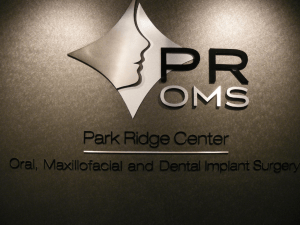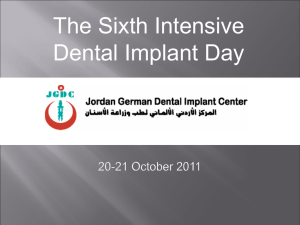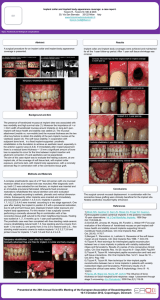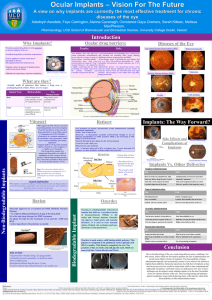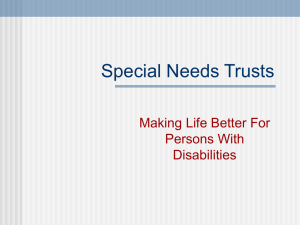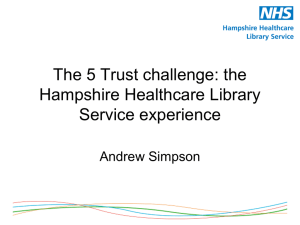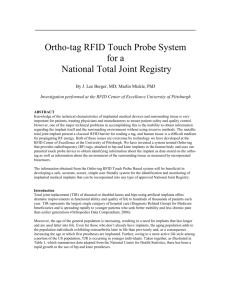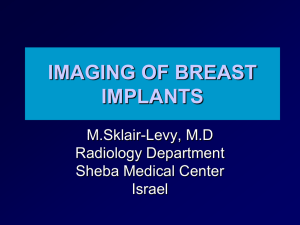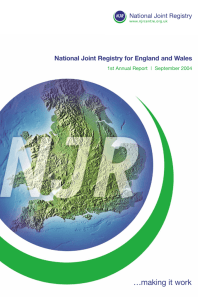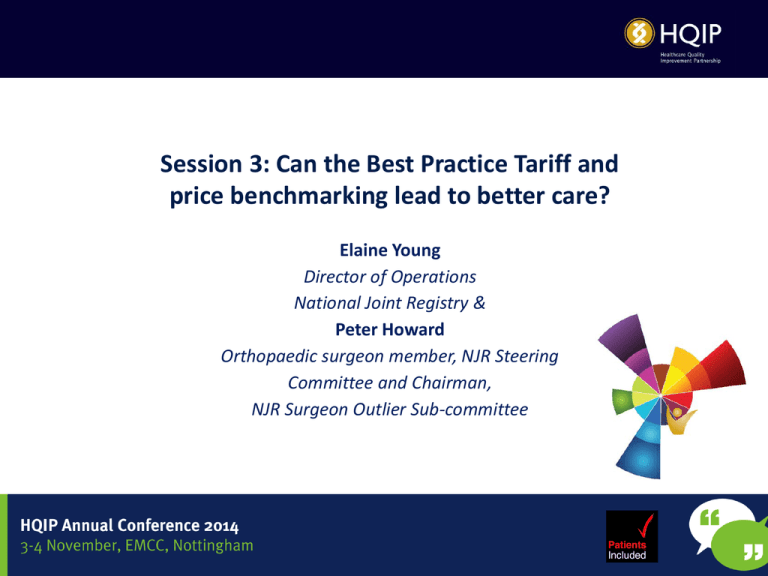
Session 3: Can the Best Practice Tariff and
price benchmarking lead to better care?
Elaine Young
Director of Operations
National Joint Registry &
Peter Howard
Orthopaedic surgeon member, NJR Steering
Committee and Chairman,
NJR Surgeon Outlier Sub-committee
About us
The National Joint Registry for England, Wales and
Northern Ireland
• Largest arthroplasty register in the world
• Hold more than 1.75 million records covering hip,
knee, ankle, elbow and shoulder joint replacements
• Monitor the performance of implants, hospitals and
surgeons
• Collaborating nationally (MHRA, CQC, Monitor)
• Collaborating internationally – a growing agenda
(FDA, EU, international orthopaedic societies)
Best Practice Tariff
(BPT)
New BPT
• For hip and knee replacement surgery in England
• Started April 2014
• NJR data reported at hospital-level quarterly, on
NHS-funded procedures in England
• Two NJR measures contribute
– Compliance
– Patient consent
• National PROMs data also forms part of the tariff
requirements
BPT leading to better care?
Through use of the tariff we hope to see improved:
• Data completeness – allowing a full picture of activity
and performance to be reported
• Data quality – improving the active consent process
to ensure we have patient details to monitor
outcomes i.e. linking primary and revision operations
together to calculate revision rates
• Best practice and engagement – organisations given
financial incentive for their participation in national
audit
BPT – learning so far
Though it is early days for the NJR:
• Intention to increase the levels of compliance and
patient consent required to drive up standard
practice
• In 2015/16, the requirements for compliance will
increase
• Impact - large number of trusts have already
contacted the NJR to enter historical data
Price benchmarking
Background to price benchmarking
Quality, Innovation, Productivity and Prevention (QIPP)
• Collaboration with the QIPP team at the DH
• Price benchmarking is one initiative that forms part
of the QIPP programme to support clinical teams and
NHS organisations to improve the quality of care they
deliver while making efficiency savings
Background to price benchmarking
Overview
• Initial pilot covering five hospitals, moving to 30
additional organisations across England and Wales
• Award winning initiative for benchmarking, Best
Practice Institute 2013
• Following this success, the pilot is now rolling out
nationally as a free of charge NJR service
– Trusts also have the option to buy enhanced reporting
services, dependent on their requirements
Price benchmarking
Objectives
• Provide local and national insight into the relative
cost effectiveness of joint replacement surgery by
individual prosthesis
• To enable providers to develop action plans around
exploitation of this data to improve cost
effectiveness of joint replacement surgery
Relating price to care
At the heart of the pilot, was the intent to examine
patient outcomes, not just cost.
Lower Cost
Lower Outcome
Higher Cost
Lower Outcome
Lower Cost
Better Outcome
Higher Cost
Better Outcome
What we set out to look at
• Measure price of implants
• Measure outcome (multi-faceted)
• Visualise this data to attempt to understand
relationships between cost and outcome by implant
• Recognise that ‘comparisons’ need to be cautioned
relative to volume and case-mix
What data?
Length of Stay
HES/SUS
Prosthesis
Revision Outcome
Hospital
Volume of activity at hospital
Patient Age and Sex
demographic
12 month PROM
NJR
Local Prosthesis
Price
Local Prosthesis Price
Pre-operative score
6 month Health gain (PROM)
Patient
Reported
Outcome
Implant costs data analysis
• 35 Trusts/units
• 5 largest manufacturers
• Annual spend on
implants
Findings: total spend and usage
Distributor
Count of Priced Components
Total Price
Biomet
DePuy
Smith & Nephew
Stryker
Zimmer
Other
TOTAL
9,992
34,273
5,125
17,854
6,537
125
73,906
£4,511,333
£13,681,324
£2,225,748
£5,999,144
£2,708,850
£30,286
£29,156,685
Total Price
9%
Biomet
DePuy
15%
Smith &
Nephew
21%
Stryker
8%
47%
Zimmer
Findings
• £29m annual spend in hip and knee implants across
the 35 organisations with the 5 suppliers included in
the pilot
• Average hip implant cost - £1,368
– averages range from £800 - £2150
• Average knee implant cost - £1,395
– average range from £1000 - £1950
Findings
• If all 35 trusts purchased these components paying at
most the AVERAGE price, the annual saving across
the trusts would be £1.98m
• at the BEST price the annual saving would be £7.76m
Findings
Link between volume purchased and cost paid is weak
• In many cases, prices paid not directly related to
volume even to same company
• In any trust there is a wide variation in the average
cost of implants between surgeons
– Driven by usage of different implants/manufacturers
Variation in Implant Cost – Primary Knees
No or primary
procedures
undertaken
Trust Max
implant cost
Trust Average
implant cost
Trusts
Trust Min
implant cost
Procedure Device Costs by Trust - HIPS
Trusts
Findings – Hip Stem Brand Pricing by Trust
Findings
• Wide variation in the average cost of implants
between surgeons
• Wide variation in implant usage within single trusts
What did participants say
Clinical
• Can I see my detailed data?
• Which procedure cost x and why?
• I wasn’t aware that component x cost more than component y!
• Can we link with clinical outcomes data / ODEP ratings for products?
Procurement
• Who is paying £x for product y!
• I have alerted supplier x to the data and asked them to explain.
• Can we model the cost implications if we migrate to supplier x?
Management
• Why do we pay more for product x?
• Who is consultant x?
What is happening now in Trusts
• Each Trust has now been invited to submit data to
the scheme and receive an individual pricing report
How can this contribute to better care?
• Managing device costs ensures best use of finite
healthcare resources
• Supports trusts and surgical teams in using data to
evidence device choice
• Supports trusts in developing implant usage protocols
• Enhances evidence-based discipline around implant
choice
Future study options
Knee Surgeons
4
3.5
3
2.5
PTIR
• Correlation with other
variables
– PROMS
– Revision rates
– Length of stay
– Readmission
2
1.5
1
0.5
0
0
5
10
15
20
Expected Number of Revisions
KneeSurgeons
Upper 99.8%
Upper 95%
Average
Outlier
Thank you
Mr Peter Howard
Orthopaedic surgeon
NJR Steering Committee
Elaine Young
Director of operations,
National Joint Registry

